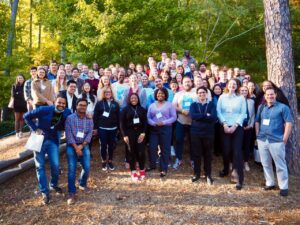Highlights
We are proud to support the mission, vision and values of the UNC School of Medicine and grateful to serve the people of North Carolina.
Department Mission:
To perform transformative biochemical and biophysical research in an inclusive and stimulating training environment.
Department Vision:
To inspire tomorrow’s discoveries and cures by decoding the molecular basis of life.

We appreciate your interest, and invite you to explore the numerous research opportunities available with our Department. Below are a few highlights to get you started.
Faculty & Research
The Department’s faculty includes 22 full-time tenured and tenure-track faculty (as of 2023), plus fixed-term, joint, and adjunct faculty who make up a unique blend of biophysical, biochemical, and molecular biology specialists. We plan to grow our numbers over the next 5 years. Department faculty members have been recipients of prestigious awards and honors from the Keck, Beckman, Sloan, Pew, ASBMB, and Searle foundations. Five faculty (Ronald Swanstrom, Dale Ramsden, Aziz Sancar, Sharon Campbell, and Jean Cook) ranked in the top 135 most highly funded NIH investigators in 2022. We are proud of our faculty for their hard work and accomplishments!
In 2015, Dr. Sancar shared the Nobel Prize in Chemistry. Armed with potent tools, experience, and a wealth of new information, our faculty are positioned to solve fundamental research questions of biology and disease. Departmental areas of research excellence include studies of genomic integrity, the dynamic biochemistry of chromatin, cell signaling and cell cycle control, epigenetics, proteomics, and enzymology. Many diseases are impacted by our basic research: cancer, cardiovascular disease (thrombosis, atherosclerosis), cystic fibrosis, neurological diseases, HIV, and other viral diseases. Basic research specialties include nuclear processes (chromatin biochemistry, DNA replication, repair, recombination, remodeling, transcription, and cell cycle regulation) cell signaling, cell adhesion, platelet biology, protein trafficking, retroviruses, protein and RNA structure, protein design, proteomics, and computational biology. Click on the Research page link for more information about our research strengths and collaborations.
In 2023, we ranked 5th best in NIH funding among all Biochemistry departments in the nation, securing over $18.7 million in funding from the National Institutes of Health (NIH), and 4th among public institutions.
We have close ties to other UNC programs and departments, including the Lineberger Comprehensive Cancer Center, the Neuroscience Center, the Integrative Program for Biological & Genome Sciences, the Cystic Fibrosis/Pulmonary Diseases Research and Treatment Center, UNC Blood Research Center, and the Center for AIDS Research.
The department enjoys the remarkable UNC institutional support for many accessible core facilities that span the realms of imaging, molecular biology, model systems, sequence-based assays, bioinformatics, and mass spectrometry. We also co-sponsor the Cryo-EM, High-Throughput Peptide Synthesis and Array Facility, Macromolecular X-ray Crystallography, Macromolecular Interactions Facility, NMR Spectroscopy, Protein Expression and Purification, and Structural Bioinformatics core facilities.
Education & Training
The department typically hosts 35-45 predoctoral students in the BCBP program alongside students in related PhD programs who train in member labs. We typically have ~40 postdoctoral fellows and senior research associates, ~30 research technicians, many dozens of undergraduate students, and additional junior lab members. We are supported by 10 administrative staff. We have created a vibrant and productive training environment for doctoral students and postdoctoral scholars that includes leadership opportunities. The Department also houses the pan-campus Program in Molecular and Cellular Biophysics, which unites faculty from the departments of Physics, Chemistry, and Computer Sciences. Faculty members teach modules in this program, the biochemistry and molecular biology courses, and they co-teach with faculty from other departments in related programs such as Genetics and Molecular Biology, Pharmacology, Cell Biology and Physiology, Bioinformatics and Computational Biology, etc..
We have students from all over the United States and around the world. After their first year in the Biological and Biomedical Sciences Program (BBSP), doctoral students can matriculate directly to the Biochemistry & Biophysics graduate program, and they can choose additional interdisciplinary training programs. Students interested in our Biochemistry Track can design a flexible program that exposes them to current research in biochemical, molecular, cell biological, and biophysical concepts. They can also apply to one of many training grants appropriate to their area of interest. For the Biophysics Track, the Molecular & Cellular Biophysics Predoctoral Training Program combines faculty from eleven UNC departments, including Physics, Chemistry, Computer Sciences, Applied Mathematics, and Medicinal Chemistry. The aim of this program is to apply mechanistic and quantitative approaches to medically significant problems. Students who are specifically interested in biophysics may wish to apply to this program as well, particularly if they would like to take full advantage of the biophysics training curriculum or wish to have the option of working with biophysics faculty in departments other than Biochemistry & Biophysics.
